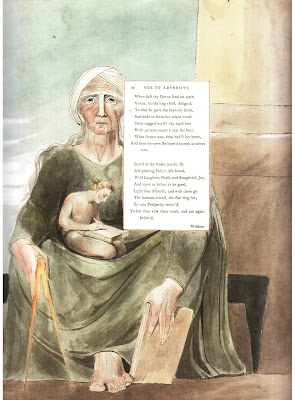To think and speak eternally is no small achievement for Blake or for us. Pursuing this aim he floundered for many years.
The words of Los in The Four Zoas record the moment when Blake got a firm grip on what he sought for himself and for us: "I already feel a World within Opening its gates, & in it all the real substances Of which these in the outward World are shadows which pass away." (E368) After twenty years in the visionary wilderness that "World within" opened its gates into the mind of the mature artist and poet.
Four Zoas, Night VII, PAGE 86, (E 368)
"Los furious answerd. Spectre horrible thy words astound my Ear
With irresistible conviction I feel I am not one of those
Who when convincd can still persist. tho furious.controllable
By Reasons power. Even I already feel a World within
Opening its gates & in it all the real substances
Of which these in the outward World are shadows which pass away
Come then into my Bosom & in thy shadowy arms bring with thee
My lovely Enitharmon. I will quell my fury & teach
Peace to the Soul of dark revenge & repentance to Cruelty
So spoke Los & Embracing Enitharmon & the Spectre
Clouds would have folded round in Extacy & Love uniting"
 |
Illustrations to Poems of Thomas Gray
Ode to Adversity
|
They served him in every conceivable way to elucidate the real world within. All the shadows, all natural phenomena, all historical events, all works of art, his own included, he treated as fluctuating insubstantials which illustrate or point to the eternal reality.
Blake thought so much of Infinity that he learned to take great liberties with time and space. In this he followed the style of the most imaginative books of the Bible. As a young man sitting at the feet of Swedenborg he had learned the doctrine of correspondences which had come down from the Bible through the heterodox tradition. As Blake applied it, every material thing has a spiritual or eternal referrent. In the words of the alchemical tradition, "As above, so below".
In the Book of Revelation for example Babylon, a code word for Rome, more generally connotes the citadel of worldly power and evil. Blake of course used it in the same way. He used geographical locations of all sorts to point to spiritual realities. Africa symbolizes slavery in all its forms, particularly the "mind forg'd manacles" (from London) of the moral law. America symbolizes the hope of freedom. In the 16th plate of 'Jerusalem' (E 160) Blake went to extremes with this sort of symbolization; he superimposed the territorial tribes of Israel upon the map of England. The lapse into obscurantism was an unfortunate attempt to evoke spiritual values from a very prosaic material reality.
He more often succeeded in translating historical events and personages into spiritual realities. Constantine and Charlemagne symbolize war with religion as its handmaid. Albion is Blake's master symbol for Man, but sometimes Moses symbolizes Man; Michael and Satan then symbolize the forces of light and darkness in contest for Man. In Blake's last great work Job became the archetypal man.
Some of his symbols (Orc, Urizen, Los) Blake elaborated into the dramatis personae of his complete myth. Their identities, not immediately apparent, grow and take on new and fuller meaning throughout a life time of reading Blake. The fascination of the prophecies lies in watching these strange symbols come forth from the mists of confusion and speak with ever increasing authority to the reader about himself and his world.
Beginning with the traditional language of symbolic discourse Blake learned to translate every facet of man's experience into a symbol of the ultimate:
Letters, To Thomas Butts, (E 712)
"...Each grain of Sand,
Every Stone on the Land,
Each rock & each hill,
Each fountain & rill,
Each herb & each tree,
Mountain, hill, earth & sea,
Cloud, Meteor & Star,
Are Men Seen Afar."
"...Each grain of Sand,
Every Stone on the Land,
Each rock & each hill,
Each fountain & rill,
Each herb & each tree,
Mountain, hill, earth & sea,
Cloud, Meteor & Star,
Are Men Seen Afar."
And two years later, in another letter poem:
Letters, To Thomas Butts, (E 722)
"For double the vision my Eyes do see,
And a double vision is always with me.
With my inward Eye 'tis an old Man grey;
With my outward, a Thistle across my way."
Letters, To Thomas Butts, (E 722)
"For double the vision my Eyes do see,
And a double vision is always with me.
With my inward Eye 'tis an old Man grey;
With my outward, a Thistle across my way."
Blake used earlier works of art as symbols which he put together to convey his thoughts about the eternal struggle and flux of values. He used the Bible, Milton, earlier Blake in the same way, all as a reservoir of ideational symbols combined into new forms to convey spiritual truth. This habit of mind can be described awkwardly at best. But it can be experienced vividly by the reader who will live into Blake's poetry. It's one of the ways in which he expressed his "desire of raising other men into a perception of the infinite".
No comments:
Post a Comment